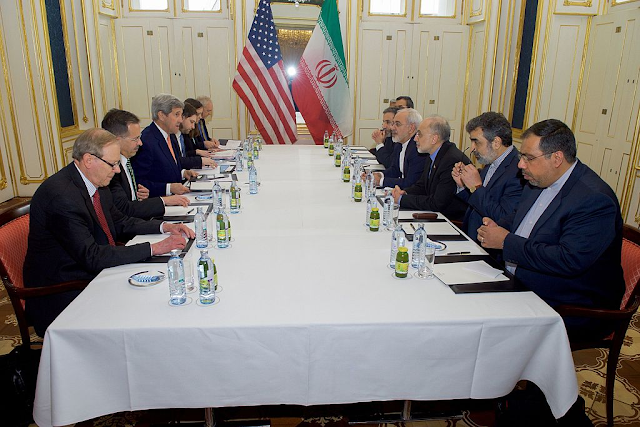Nigeria’s Stake in the Iran Nuclear Deal
Abuja sees the Joint Comprehensive Plan of Action, better known as the Iran Nuclear Deal, as an abstract issue. However, there are at least two reasons why the debate over its survival matters.
US President Donald Trump’s decision to unilaterally withdraw from the Joint Comprehensive Plan of Action (JCPoA) – better known as the Iran Nuclear Deal – and reimpose full sanctions on Tehran has been widely condemned by countries around the world.
US President Donald Trump’s decision to unilaterally withdraw from the Joint Comprehensive Plan of Action (JCPoA) – better known as the Iran Nuclear Deal – and reimpose full sanctions on Tehran has been widely condemned by countries around the world.
Thus far, there has been silence from Abuja. The attitude seems to be that the Iran nuclear deal is an abstract issue with little relevance for Nigeria’s foreign policy. Given its esoteric nature, public opinion has also unsurprisingly been uninterested in the fate of the nuclear pact.
Public commentary, to the extent there has been any, has focused on what impact the JCPoA’s collapse will have on the price of oil – Nigeria’s main source of revenue.
There are, however, at least two other reasons why the debate over the survival of the Iran nuclear deal should matter to Nigeria.
Nigeria Voted
The UN Security Council, on July 20, 2015, unanimously adopted resolution 2231 endorsing the JCPoA. Nigeria was among the 14 other countries that voted to endorse the nuclear pact, therefore making it a stakeholder in the survival of this consequential international treaty.
Kayode Laro, Nigeria’s then-UN Ambassador, in his statement to the UNSC after resolution 2231 was adopted, called on the parties to the deal to “implement all provisions of the accord in good faith and in the spirit of full transparency”. This has obviously not been the case with the US.
It has not only violated its obligations by unilaterally withdrawing and reimposing full sanctions, despite Iran fully complying with the deal as confirmed by the US’ own intelligence agencies and the IAEA – the international organisation responsible for monitoring and verifying Iranian compliance.
It has also, especially under the Trump administration, not implemented its side of the deal in good faith. The long-running ambiguity over whether the US will stay or leave and reimpose sanctions – which scared off investors from Iran – was so successful that in the run-up to Trump’s withdrawal, prominent anti-JCPoA hawks were arguing that it’s better to stay and “enjoy the best of both worlds: Iranian compliance [with the JCPoA] without the international investment Tehran had counted on”.
In light of this, Nigeria should follow the lead of the Chairperson of the AU Commission and South Africa and make a statement concerning the fate of the JCPoA – especially as Nigeria was among the group of countries that directly endorsed it.
A core reason why anti-JCPoA hawks castigate the nuclear pact is because it acknowledges Iran’s right to domestically enrich uranium and it lifts the limits on the country’s civil nuclear activities after 2040. It was also a key sticking point between the E3 – France, Germany and UK – and the US during the negotiations to keep Washington in the deal.
“It’s totally unrealistic to believe that Iran will accept perpetual limits on its sovereignty”, a French official is quoted as saying in a Crisis Group report detailing those talks.
So what does this have to do with Nigeria?
Enriching uranium is a critical process in civil nuclear power generation – and in building nuclear weapons. Because of this, the US has a longstanding policy of never accepting that countries have an inherent right to enrich. Instead, the US wants a normative landscape where countries generating electricity from nuclear power must buy the enriched uranium they need from a select few that are legally permitted to enrich.
The civil nuclear agreement the US signed with the UAE in 2009 – the so-called 123 agreement, named for section 123 of the US’ 1954 Atomic Energy Act – is often touted in Washington as a “Gold Standard” for civil nuclear cooperation because the UAE voluntarily renounced pursuing a domestic enrichment programme. The US is now pushing this model as a condition for a nuclear agreement with Iran.
“With respect to its nuclear activities, why would we allow Iran more capability than we have permitted the United Arab Emirates and that we’re asking for the Kingdom of Saudi Arabia?”, bristled Secretary of State Mike Pompeo in his May 21 speech which unveiled the Administration’s new Iran strategy.
The US justifies this approach on its reading of the Nuclear Non-Proliferation Treaty (NPT), which neither affords nor denies the right to enrich.
Unsurprisingly, most non-nuclear weapons states, such as Nigeria, South Africa, and key US allies like Germany and Japan, totally reject this reading of the NPT for obvious reasons: It handcuffs their scientific development and extends the nuclear weapons apartheid to civil nuclear activities. Incidentally, Saudi Arabia has thus far refused to sign a UAE-type agreement with the US citing its sovereign right to pursue enrichment.
For Nigeria therefore, the JCPoA’s acceptance of Iran’s inherent right to a domestic enrichment programme is an important normative victory. As noted by Kayode Laro: “The agreement also provided a clear affirmation of the right of States to the peaceful use of nuclear energy”.
Abuja understandably sees the JCPoA as an abstract issue that has little relevance for Nigeria’s immediate foreign policy objectives. However, resolution 2231, which endorsed the nuclear pact and which Nigeria voted for, and the question over an inherent right to domestic enrichment, are at least two reasons why we should be attentive to the JCPoA’s fate – and to what comes after it.



Caesar Casino review - Shootercasino
ReplyDeletePlay at Caesar Casino and 제왕카지노 롤링 get 100% up to €1000 + 50 FS bonuses! Sign up now and get 100% up to €1000 + 50 FS Promos!